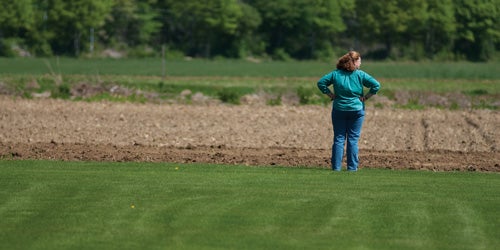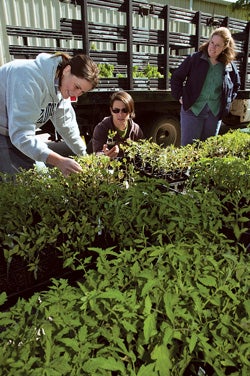Farming in Rhode Island: A Growth Industry

Plant Sciences will be offering a new undergraduate track with courses in vegetable and fruit growing, soil management, and good old-fashioned composting.
The term “sustainable” probably wasn’t used much in 1888 when the State Agricultural School, forerunner of the University of Rhode Island, was founded, but the founders likely would be pleased with a new academic venture that still has the word “agriculture” in its title.

Pending approvals, come spring 2011 the Department of Plant Sciences in the College of the Environment and Life Sciences will offer a set of courses to prepare students to address a growing world problem—finding sustainable, energy efficient ways of feeding people in an era of declining farmland and increasing energy costs.
“Sustainable agriculture” is to the 21st century what “the College of Agriculture and the Mechanic Arts” was to the 19th when the old State Agricultural School underwent a name-change in 1892—a giant leap forward in technology.
But any resemblance of today’s agriculture to that of the 19th century is tenuous. While you still need soil, sunlight, and water to grow vegetables, today you also need knowledge of how to efficiently harness and manage those basic elements—and that involves a lot of science.
To accomplish that, Plant Sciences will be offering a new undergraduate track with courses in vegetable and fruit growing, soil management, and good old-fashioned composting. “We are a land grant institution and have a responsibility to keep training students to work the land,” says Brian Maynard, a horticulturalist who also chairs the department.
In recent decades, turfgrass and ornamental plants have been the most visible teaching and research thrusts in the department. Using those high–tech horticulture sectors as a foundation, Plant Sciences faculty are embarking on sustainable agriculture as a third track to prepare students for issues such as food security, cost, safety, and availability.
Young people, says Maynard, strongly relate to today’s issues of energy, global warming, and healthy food and are interested in careers that will provide solutions. “The main thing that precipitated this change was that we started to think further out in the future—10 to 20 years out—and we realized that there are a lot of people concerned about our ability to feed ourselves when we are no longer able to ship food all over the place because of the rising cost of fuel,” says Maynard.
“We recognize that one of the greatest threats to food security is the loss of agricultural land, so we are really concerned about what we can do to educate people about the importance of land resources to our survival.”
Maynard, who is active in community vegetable gardening, said farmers in the state are excited to see URI move into sustainable agriculture.
Maynard’s colleagues in Plant Sciences didn’t need any convincing. Some faculty members who work with turf and ornamentals also have agricultural expertise. Rebecca Brown, who works on turf genetics but is trained in vegetable genetics, is already teaching some vegetable growing courses; Nathaniel Mitkowski is a turf pathologist with a background in vegetable pathology; and Steven Alm is an entomologist who has been responsible for the apple orchard and blueberry field at East Farm for several years.
In addition there are faculty in other URI departments who can offer courses in soil management and microbiology, nutrition, food safety, and animal husbandry (a lot of small farms have animals).
“It’s not a stretch for us to retool to some extent to meet this demand,” says Maynard, who notes that URI will be able to take full advantage of its three farms (East, Peckham, and agronomy) and give students hands-on experience in raising fruits and vegetables.
Maynard thinks the new track will attract more students to URI. He notes that even though the sustainable agriculture curriculum is not fully in place yet, there are several students currently enrolled at CELS whose career goals lie in farming and market gardening.
Figures released last year by Kenneth Ayars ’83, M.S. ’85, (see his profile on page 35) chief of the state Division of Agriculture, show that there is a marked increase in the number of farming operations in the state, and the majority of the startups are worked by young people interested in sustainable farming methods—especially organically raised produce. Statistics also show that the number of women farmers is growing in the state.
Earlier this year, Brown landed three grants to help her with sustainable agriculture endeavors, including one to construct three “high-tunnels”—plastic-covered structures that look like greenhouses but have no heat or electricity. Her plan is to have students gain experience in the high tunnels by raising salad greens in the cool weather months and melons in the summer.
The structures will be used as a demonstration for commercial growers who are interested in extending their growing seasons. In Rhode Island, for example, melons get off to a slow start and don’t mature until late summer—just when consumer interest in melons wanes. By raising melons in high tunnels, growers could get produce to market earlier when demand is at its highest.
Brown’s students and staff, assisted by URI Master Gardeners, are already growing vegetables at the agronomy fields for the Rhode Island Community Food Bank and other charities. Efforts are also under way to expand the fruit orchards at East Farm. The existing orchards are harvested by URI Master Gardeners along with church and youth group volunteers, and the produce is donated to the Rhode Island Community Food Bank.
Brown will also be exploring different tilling methods and growing cover crops to boost soil fertility and structure and to address weed issues. “The number one problem for organic farmers is weed control since they cannot use herbicides,” notes Brown, who hopes to find some solutions. The high tunnels and tilling trials at agronomy will provide experiential learning for students while also providing demonstrations and research for farmers.
Brown is enthused with the direction of Rhode Island agriculture and cites the formation of the Rhode Island Agricultural Partnership, which involves a number of groups including conservation districts, a foundation, the Rhode Island Division of Agriculture, and URI.
CELS Dean Nancy Fey-Yensan is thrilled with the decision to pursue sustainable agriculture as an area of study for undergraduates and sees possibilities for expanding these programs: “The College of the Environment and Life Sciences is focused on the health of the planet, the environment, and its people. This direction for Plant Sciences fits into this theme perfectly. We are already seeing potential partnerships with small businesses, grass roots agencies, and even within the college and across the University.”
Fey-Yensan is talking to URI’s director of dining services about serving locally produced foods in the dining halls. And Maynard has been in contact with the URI Slow Food Club about starting a student-run organic farm that would produce food for both the dining halls and the Rhode Island Community Food Bank.
A few years ago, says Fey-Yensan, “the Department of Nutrition and Food Sciences and the Department of Fisheries, Animal, and Veterinary Science developed a graduate course on sustainable food production, and students are clamoring to enroll. Beginning last year, an interdisciplinary course for undergraduate students focused on these issues as well.”
There are both short-term and long-term benefits to training students in sustainable agricultural science and practices, and the college can provide the perfect laboratory for study on its three farms, notes Fey-Yensan:
“The development and growth of these programs sends a clear message that the University recognizes the importance of sustainable practices on improving the economy; reducing the use of pesticides, thus improving the health of the environment; reducing land and water use, thus conserving natural resources; and most importantly, in supporting innovative food production methods so that we can better feed a hungry world.”
“There is global significance to programs of this nature,” says Fey-Yensan. “This type of curriculum develops students as global citizens, discussing and seeking solutions to some of the most fundamentally daunting issues of the 21st century—preservation of scarce agricultural resources while producing healthful, accessible, and affordable food for everyone.”
— Rudi Hempe ’62
 Home
Home Browse
Browse Close
Close Events
Events Maps
Maps Email
Email Brightspace
Brightspace eCampus
eCampus


